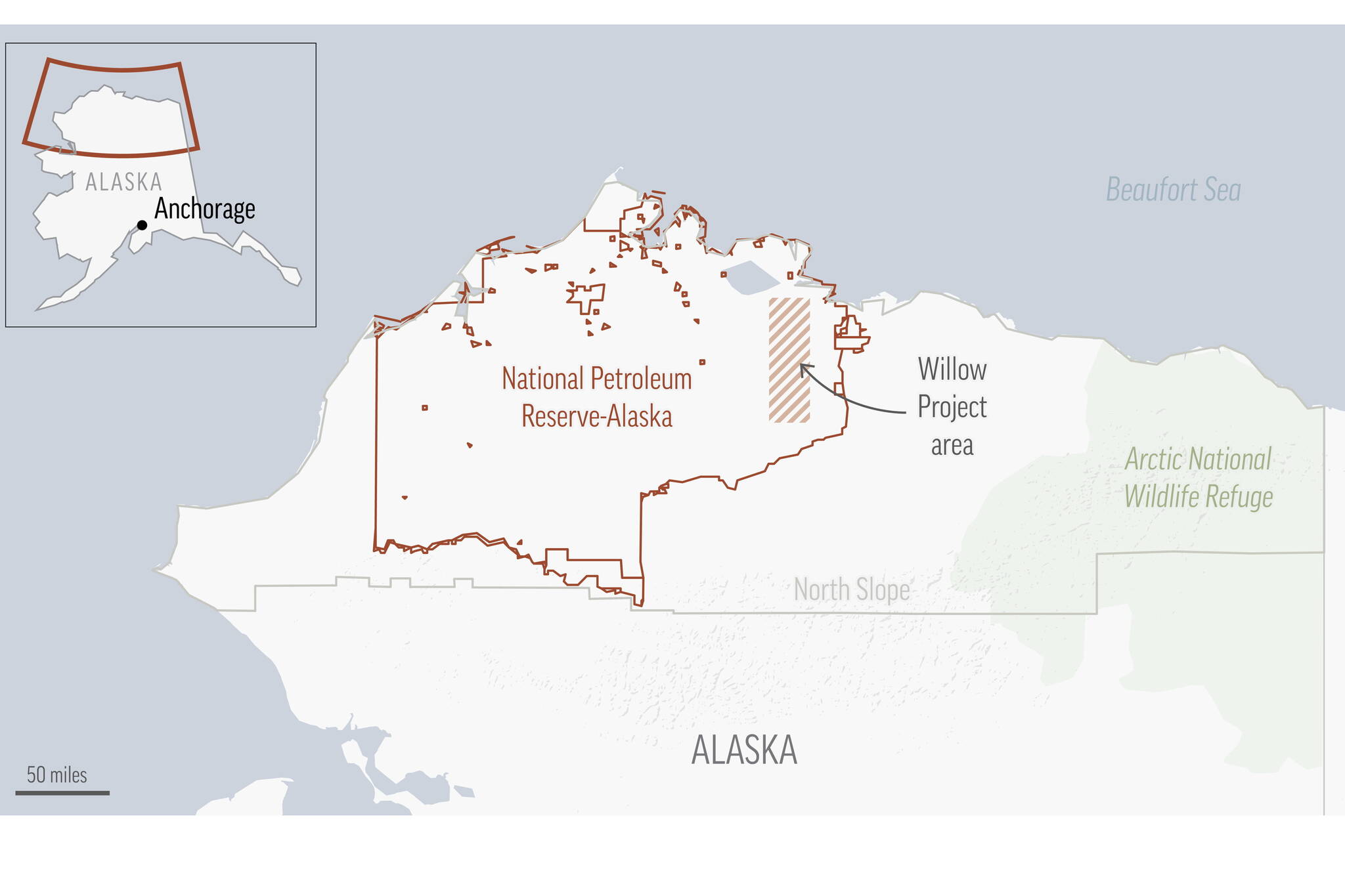The Willow oil field project in the National Petroleum Reserve-Alaska will be officially approved by the Biden administration next week, according to reports from CNN and Bloomberg News citing people “familiar with the matter”
The project will allow ConocoPhillips to drill at three locations, the minimum the company and supporters said is necessary for Willow to be economically viable. The apparently decision came after intense opposition by environmentalists concerned about climate impacts, and some Alaska Native leaders in the vicinity of the project concerned about harm to wildlife hunted for subsistence and other environmental damage.
But an overwhelming show of support from Alaska leaders — including the three members of the congressional delegation, a resolution unanimously approved by the state Legislature and a large coalition of Alaska Native entities — also was presented to Biden during the past month. Among those visiting Washington, D.C., to lobby on behalf of the project was state Sen. Donny Olson, a Golovin Democrat who represents the North Slope region, who said Friday the efforts were essential in a landmark victory.
“The president was hearing the Native people in Alaska and many of the Alaskans were not in favor of the project,” he said. “Because of that we were back there saying ‘We are Native people in government that are wholly behind this.’”
White House Press Secretary Karine Jean-Pierre issued a “non-denial denial” of the report, stating “no final decisions have been made — anyone who says there has been a final decision is wrong.” Similarly, ConocoPhillips stated they are “unable to comment until we see the published (decision)” The Bloomberg report, as noted, stated the official decision will be issued in the days ahead.
Some Alaska leaders who are among the foremost advocates for Willow, including Gov. Mike Dunleavy and state Rep. Josiah Patkotak who represents the project area, also said they are declining to comment about the anonymously sourced story and waiting until an official decision is announced. A joint statement is pending from the three member of the congressional delegation, who met with President Biden last week to lobby for the project, according to a spokesperson for U.S. Dan Sullivan.
A joint statement was also issued by several members of the legislature’s mostly Democratic minority caucus.
“The news today from Washington is very reassuring, and we look forward to the official announcement,” said Minority Leader Calvin Schrage, an Anchorage independent. “The support of the Biden Administration demonstrates a commitment to responsible energy development and a recognition of the importance of projects like Willow to the country’s future.”
The $8 billion project is slated to drill more than 200 wells during a 30-year time span. Advocates say it will generate up to 2,500 construction jobs, about 300 permanent jobs and about $1.2 billion in property tax revenue for North Slope Borough to support a wide range of essential services. ConocoPhillips also claims the project will generate $8.7 billion in royalty payments and tax revenue to state, federal and local governments.
But environmental groups, and other national and global opponents, argued the project will release 9.2 million metric tons of carbon pollution a year – the same as two million gas-powered cars — and more than wipe out all emissions savings from renewable energy projects on U.S. public lands by 2030.
“We need our leaders to think long-term,” Len Montgomery, public lands campaign director for Environment America, said in a prepared statement. “Clean energy, not oil, is our future. Allowing a brand new Arctic oil project to break ground in one of our most sensitive ecosystems would be short-sighted. This project will exacerbate climate change, and will directly harm caribou and polar bears.”
ConocoPhillips began the permitting process for the Willow project in 2018, seeking five drilling sites, and it was initially approved in 2020 under former President Donald Trump. But a year later a federal judge ruled a faulty climate analysis was involved and sent the proposal back to the U.S. Department of the Interior.
Last month, the Bureau of Land Management gave preliminary recommendation to the three-pad project, with the Biden administration having 30 days to issue a formal notice of decision.
Olson said that while the immediate focus is to “celebrate this victory,” there are still obstacles ahead before Willow becomes a reality. Among those are possible legal challenges by project opponents seeking an injunction on drilling activity.
“It’s legal maneuverings like that means there’s no end to the games that can be played on this process,” he said. “Just because we won the battle doesn’t mean we won the war.”
• Contact reporter Mark Sabbatini at mark.sabbatini@juneauempire.com

